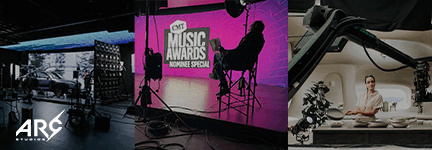
Virtual Production: “Maybe Adding Sound to Moving Pictures Was a Bigger Deal”

Nashville-based production company Gear Seven pushes the limits of creativity, technology and possibility - and innovates like it’s nobody's business. Alongside a non-exclusive roster of directors and production capabilities, Gear Seven offers hardware, LED volume studios and virtual production via its sister companies Shift Dynamics and Arc Studios.
Gear Seven has teamed up with LBB to speak with agency production leaders about innovations in production technology and how it is revolutionising commercial production. This series investigates the importance of education in this area for agencies and brands and offers a fun opportunity to nerd out on all things technical, while sharing memories of their most awe-inspiring and unforgettable moments on set.
Today, LBB’s Addison Capper chats to Jeff Beverly, global director of content at Commonwealth//McCann. In his role, Jeff oversees all global production disciplines on the agency’s Chevrolet account, which is run out of Detroit, the home of General Motors.
Jeff is a vocal advocate for the possibilities and virtues of virtual production, as the following interview will show…
LBB> Throughout your career – what was the most exciting or groundbreaking piece of ‘new’ kit or technology that was introduced to you and why?
Jeff> In 2017, we had been working with The Mill with their ‘Blackbird’, an amazing motion capture rig. This opened the door to the opportunity for Chevy/GM to work with Epic Games on a project that would be a first of its kind to be debuted at the Game Developers Conference keynote. It combined, for the first time, real-time rendering of the game engine with traditional filmmaking. While common today, five years ago it was breathtaking to be able to change the vehicle while the film played. Not just the colour, but the entire vehicle. Our 2017 Camaro changed into a vintage ‘60s version at the push of a button, maintaining accurate lighting, shadows and reflections. We saw the future with that project, and sure enough Epic went on to expand this technology into film and television, paving the way for virtual production.
LBB> What are the technologies that you have your eye on now that either are having a big impact on how production is done - or have the potential to change things in a big way?
Jeff> Hands down, virtual production. I can’t think of another example of such a monumental shift in our ability to produce content in a streamlined, sensible way. Maybe adding sound to moving pictures was a bigger deal. That’s the only one that comes close. Other than that, production has remained pretty much the same for the last 100 years until now.
LBB> What piece of kit (big or small and mighty) still makes you feel in awe when on set?
Jeff> To date, we have used technology almost exclusively in post-production. The saying ‘fix it in post’ has been a long-running gag that is kidding/not kidding. Bringing unreal engine environments into an enclosed LED volume is awe-inspiring. Seeing the lighting and reflections on sheet metal and every reflective surface is mind-blowing. I remember shifting my gaze from the monitor to the set and back and trying to reconcile it all in my brain. Seeing a pretty much colour corrected, cleaned up and ready to conform shot in-monitor was a weird new thing.
LBB> Can you talk us through one or two of the most exciting recent productions that you’ve been involved in that you think had a really interesting innovation or technological aspect to them?
Jeff> My first virtual production was for CES 2021. We were tasked with creating show content. One film had two people driving on a freeway, and Framestore had suggested doing this on a stage with LED screens.
It not only worked, but it blew my mind in a lot of ways. We did not have to shut down a freeway (I’ve done that before and it’s not easy). The entire film had a consistent time of day, so colour correction and clean up was a fraction of what we were used to. There were little things that shook me as well, such as seeing the director walk up to the talent in the vehicles and have a conversation in between takes. Gone were process trailers and walkie talkies. It was an incredibly creative and organic way to work with the talent.
LBB> We’ve spoken about virtual production a lot but what are your general thoughts about its potential in advertising production?
Jeff> If it’s not obvious by now, I am a believer, user and evangelist for this technology. As client budgets get squeezed by covid cost, inflation and other factors, virtual production is a way to spend existing budgets more efficiently. Think about the cost of a location move on a traditional shoot. Think about the cost of sky replacements and clean-up. What do inconsistent skies do to your budget? We all love golden hour. It’s a shame it only lasts a short time, but now we can craft entire films in a single golden hour. And think about what it costs to leave the LA zone. It’s amazing you can have virtually (pun intended) ANY location without leaving the LA zone. I don’t see advertisers going back to traditional [production] once they experience this and see the benefits.
LBB> VP can involve quite a different workflow/process - is that something you feel agencies and brands need to educate themselves on or does it lie with the production company?
Jeff> Education is very much needed. We are working with Epic Games to create a training program for creative and production to understand this technology, understand the new workflow and learn to think differently when concepting.
LBB> With so many platforms to produce for, what’s your preference - to maximise assets across platforms or to produce content that’s more tailored to each content - or some sort of balance? What sort of conversations do you tend to have about this sort of thing?
Jeff> I remember the days where you would shoot 30 seconds and have a 15-second cutdown. When budgets are thin and time is tight, social assets can suffer. The key is to have maximum efficiency to stretch your budget to accommodate independent social assets. Authenticity is so vital for social, so production can help by providing maximum efficiency to be able to afford ancillary content specific to the platforms.
LBB> Quite often production involves trying to solve a problem that’s never been attempted before - and that can mean hacking existing technology or trying to find new technologies. When you get a project that has such technological challenges, how do you and your team like to approach them?
Jeff> Anything is possible with the right technology. I don’t like it when inefficient production approaches are the result of chaotic parameters. Production can solve problems using inventive tech and approaches, but you have to be surrounded by teams that are somewhat adventurous and trusting.













